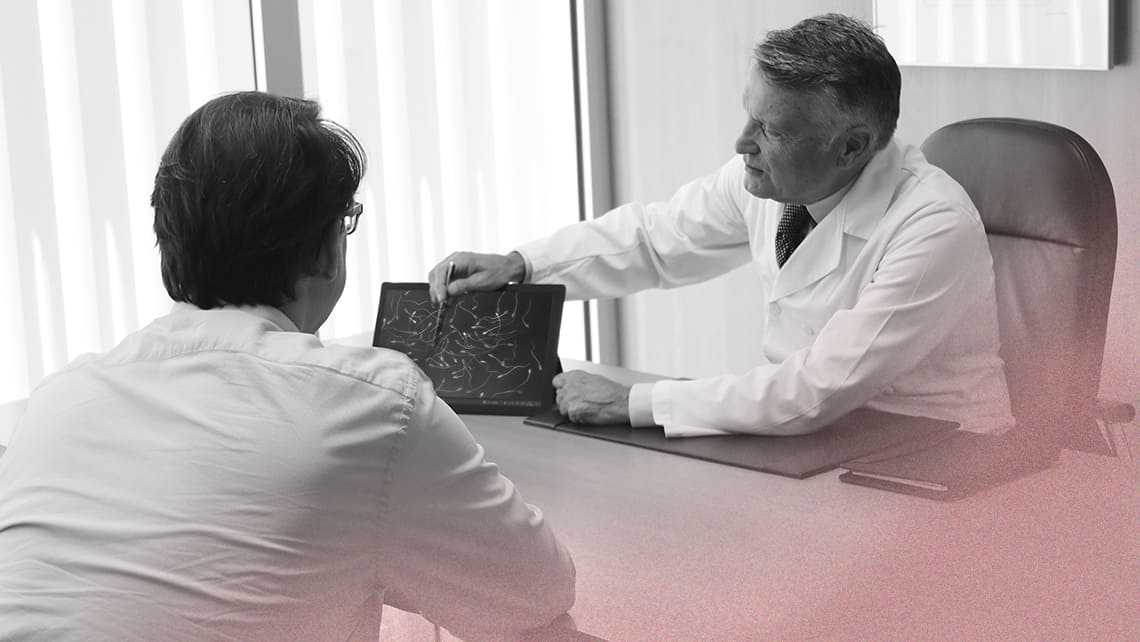
Become a father after the age of 40 – 50. Does it have any risks?
Many studies has been made on how older maternal age is related to a lower probability of achieving pregnancy. Higher miscarriages frequency and higher risk of certain chromosomal abnormalities in the foetus. But little attention has been paid to when it is the man who for various reasons decides to postpone fatherhood.
All statistical records from advanced countries make it clear that the age at which women have children has been progressively increasing in recent years.
The scenario is not much different for men. This pattern of behaviour is occurring in all developed countries around the world.
And given that this trend does not appear to be changing, it is therefore critical to ask not only what is the impact on our success rate, or the impact on the mother. Also what is the impact on the offspring health.
Although sperm production is continuous from adolescence through adult life, recent studies in ART populations suggest that older paternal age is associated with lower pregnancy and live birth rates and that sperm quality may deteriorate and negatively impact outcomes as early as age 45 (1,2). Furthermore, additional studies are beginning to note certain risks to pregnancy and offspring (3).
Índice
Consequences of the father’s advanced age
With the passing of time we already knew that the volume of ejaculate and the number of spermatozoa in the ejaculate decreased slightly. With some contradictory results, a slight increase in the probability of miscarriages and premature births is also described. Although at a much lower rate than the effect of older age in women.
However, the main focus of attention has recently been on the effects, which in the long term may have an impact on offspring.
Recent studies have shown that the risk of genetic alteration in offspring doubles with increasing male age in every 10 years.
Some theories have attempted to demonstrate that spermatozoa may carry new or “de novo” genetic mutations or alterations, i.e. not inherited, which increase progressively as a man’s age increases. These alterations have been linked to an increase in the appearance of certain types of diseases. Especially autism or autistic spectrum disorders and schizophrenia.
For this reason, there seem to be indications that not only environmental aspects such as obesity, smoking, poor diet and exposure to toxic agents may influence the increase of these effects in offspring. Also the advanced age of men at the time of gestation may be partly a risk factor.
It appears that increasing age may indeed be related to an increased risk of certain diseases and complications at birth. Such as neuropsychiatric, genetic and later reproductive disorders. Recently, different studies have also been published linking paternal age to gestational alterations, such as premature birth and lower birth weight. As well as a higher incidence of gestational diabetes in the mother.
Prevention
Although there’s no consensus on the age at which these effects begin to be felt, most studies agree that 45 years of age is considered an advanced paternal age, although the consequences are more noticeable from the age of 50 onwards and become progressively more accentuated.
Therefore, although the loss of fertility is not so dramatic as men’s age increases in relation to women’s, it is an issue that cannot be ignored. Especially if the male also has genitourinary anomalies or consumes toxic substances such as tobacco and/or other drugs that deteriorate the functionality of the spermatozoa.
Therefore, although it is more important for women to avoid postponing motherhood until an advanced age, it is advisable for men to be aware of these possible effects on their offspring and to be able to adequately plan the ideal time to become fathers.
BIBLIOGRAPHY
- Influence of paternal age on assisted reproductive technology cycles and perinatal outcomes. Fertil Steril. 2021. Marsidi AM, Kipling LM, Kawwass JF, Mehta A.
- Is increasing paternal age negatively associated with donor oocyte recipient success? A paired analysis using sibling oocytes. Fertil Steril. 2021. McCarter K, Setton R, Chung A, An A, Rosenwaks Z, Spandorfer S.
- Relationships between the age of 25.445 men attending infertility clinics and sperm chromatin structure assay (SCSA ®) defined sperm DNA and chromatin integrity. Fertility and Sterility 2020.
THE FOLLOWING MAY ALSO BE OF INTEREST TO YOU:
